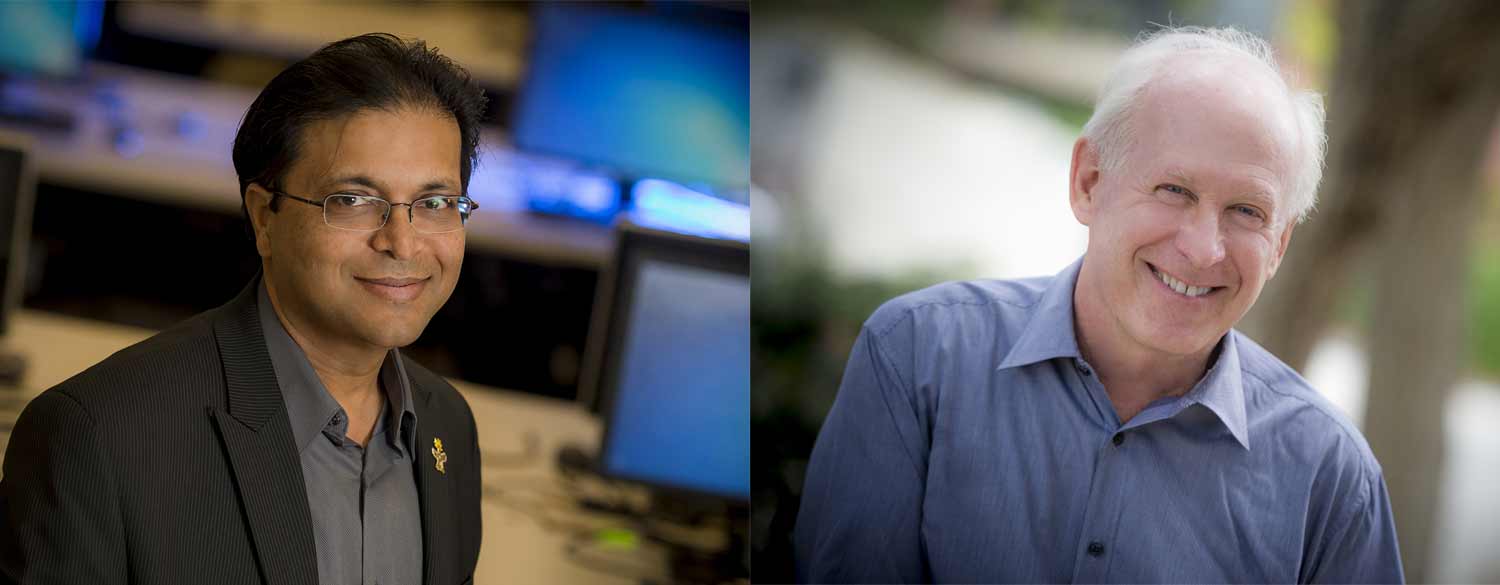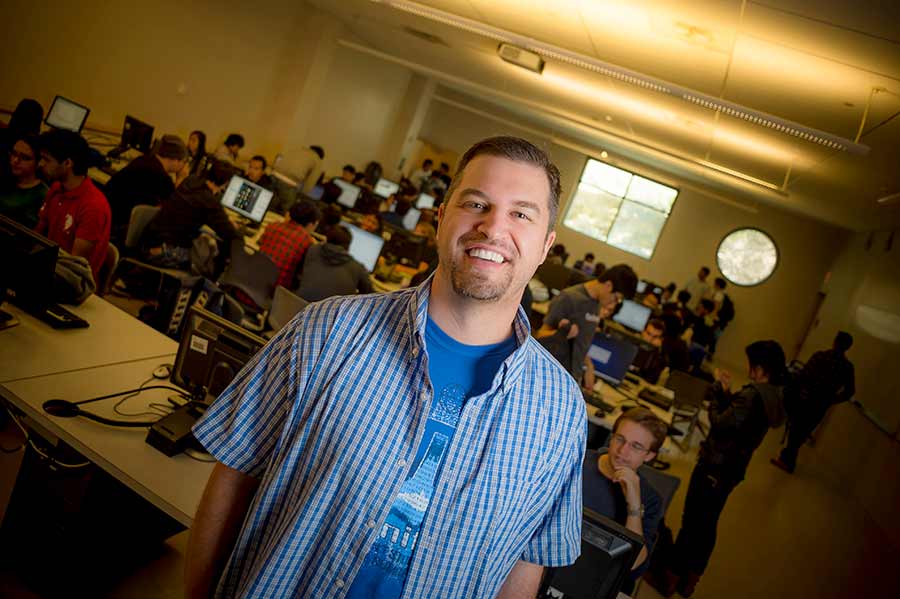
By:
- Kim McDonald
- Doug Ramsey
Published Date
By:
- Kim McDonald
- Doug Ramsey
Share This:

From left, Rajesh Gupta and Jeffrey Elman
A Campus Hub for Data Science
A new institute at UC San Diego, which will be celebrated tomorrow at a campus dedication, is building on the university’s strengths of multidisciplinary collaboration and data science to allow researchers across the campus to incorporate data science into their respective disciplines to better understand and make predictions about the world around us.
The cross-disciplinary Halıcıoğlu Data Science Institute, or HDSI, will become the campus hub for data science. It will help train students in the latest data-science techniques and transform the research of scholars who are now increasingly limited in making progress in their disciplines because of the need to make sense of the massive amounts of data generated from their research.
Rajesh Gupta, a professor of computer science and engineering, and Jeffrey Elman, professor of cognitive science, are the co-directors of the new institute, which will be showcased in a student workshop on data science on Friday following the invitation-only dedication. Elman is former dean of the Division of Social Sciences at UC San Diego, and Gupta is a former chair of the Department of Computer Science and Engineering in the Jacobs School of Engineering.
“Professors Gupta and Elman are among this university’s most distinguished faculty members and administrators, and they are uniquely positioned—with input and expertise from many other departments—to make UC San Diego one of the world’s leading academic centers of excellence in the burgeoning field of data science,” said UC San Diego Chancellor Pradeep K. Khosla. “We have a long history of deciphering insights from large volumes of data, and we have been doing so since long before the term ‘data science’ was coined.”
The institute is named in honor of UC San Diego computer science alumnus Taner Halıcıoğlu (pronounced hah-li-jyo-loo) (B.S. ’96), an early Facebook employee who last spring made a $75 million gift to UC San Diego to support data science initiatives. The gift from Halıcıoğlu was the largest ever received from a UC San Diego alumnus. In addition to Facebook, he also worked at eBay and Blizzard Entertainment, and currently is a private investor as well as a lecturer in the Department of Computer Science and Engineering.
Halıcıoğlu hopes the new institute will promote a cross-disciplinary field that is considered the backbone of many other disciplines.
“Data science is transforming biology, physics, chemistry, medicine, math and many other fields in addition to computer science,” he explained. “Take personalized medicine and genomics. Gathering, sequencing, analyzing and storing an individual’s genetic makeup will allow physicians to find causes and correlations that can determine how things are related and what they reveal. That’s the kind of fundamental transformation data science is bringing to almost every field.”
The new institute will host faculty as well as staff researchers, and faculty appointments can be split across other centers and departments. In addition, dozens or even hundreds of professors from other departments are expected to “affiliate” with the data science institute—making them eligible to compete for seed grants, collaborate with data science scholars and gain access to the institute’s data-science expertise.
The institute will sponsor seminars and provide seed grants to affiliated faculty and researchers for demonstration projects where Data Science is having an impact.
“From the outset,” said institute co-director Gupta, “we are encouraging researchers across campus to engage with us in order to put the institute’s combined expertise in data science to work in helping enable new research in many fields.”
As part of its academic mission, the institute is also developing a pathway to a five-year B.S./M.S. degree program that would include a data science specialization at the master’s degree level for students interested in specific areas of data science, including health informatics, business analytics, biostatistics or digital archaeology.
The institute will also develop translational programs, ranging from short-term training programs to engagement with industry (via internships and sponsored research). In addition, the institute will collaborate with civil organizations to maintain, manage or develop policies for infrastructure that benefits society, including in healthcare, transportation, energy, water and other sectors.
“It was inevitable that UC San Diego should make a massive investment in training tomorrow’s students in data science,” said Gupta. “UC San Diego is a pioneer in many fields that have contributed to what we call data science today—from artificial intelligence and machine learning to genomics and computational biology—and we’ve had long experience with developing other successful multi-disciplinary programs, for example, in neuroscience and bioinformatics, and other research units such as the Qualcomm Institute. So, the campus is the logical home for an institute that impacts society and the economy in a big way.”
Indeed, Gupta’s co-director of the institute, Jeffrey Elman, is a pioneer in the field. A psycholinguist by training, Elman—a member of the UC San Diego faculty since 1977—is credited with introducing the concept of recurrent artificial neural networks that can learn from observing data sets.

Taner Halıcıoğlu
With his groundbreaking 1990 paper on “Finding Structure in Time,” Elman conceived and first used a neural network that introduced a new way of thinking about language processing and learning. His work led to the creation of computational models based on the structure and functions of biological networks linking neurons in the brain.
“It’s these software versions of tiny neurons whose structure allows them to make changes to their own programming in order to discern new insights from large volumes of data,” said Elman. “Artificial neural networks are now the building blocks of not just data science, but of machine learning and artificial intelligence as well, and they are central to major new approaches in cognitive science, computer science, evolutionary theory, developmental psychology and other fields.”
The implications of neural nets and data science are not just academic. Banks and credit-card issuers, for example, use neural networking to predict fraudulent charges—or borrowers who might not pay their bills.
The new institute has also forged close ties with other ongoing research units at UC San Diego, including the Kavli Institute for Brain and Mind, Information Theory and Applications Center, the SDSC Data Hub, and others. HDSI will also support a collection of working groups which could lead to large-scale projects, or to define research topic areas, such as biological databases, smart cities, metadata models.
The institute will be located in several locations on the campus, reflecting its goal of catalyzing and integrating work across all units of the university. The initial administration and research labs will be in the San Diego Supercomputer Center, while Student Affairs will be in Atkinson Hall. Future satellite hubs are envisioned at other sites.
Share This:
You May Also Like
Stay in the Know
Keep up with all the latest from UC San Diego. Subscribe to the newsletter today.


